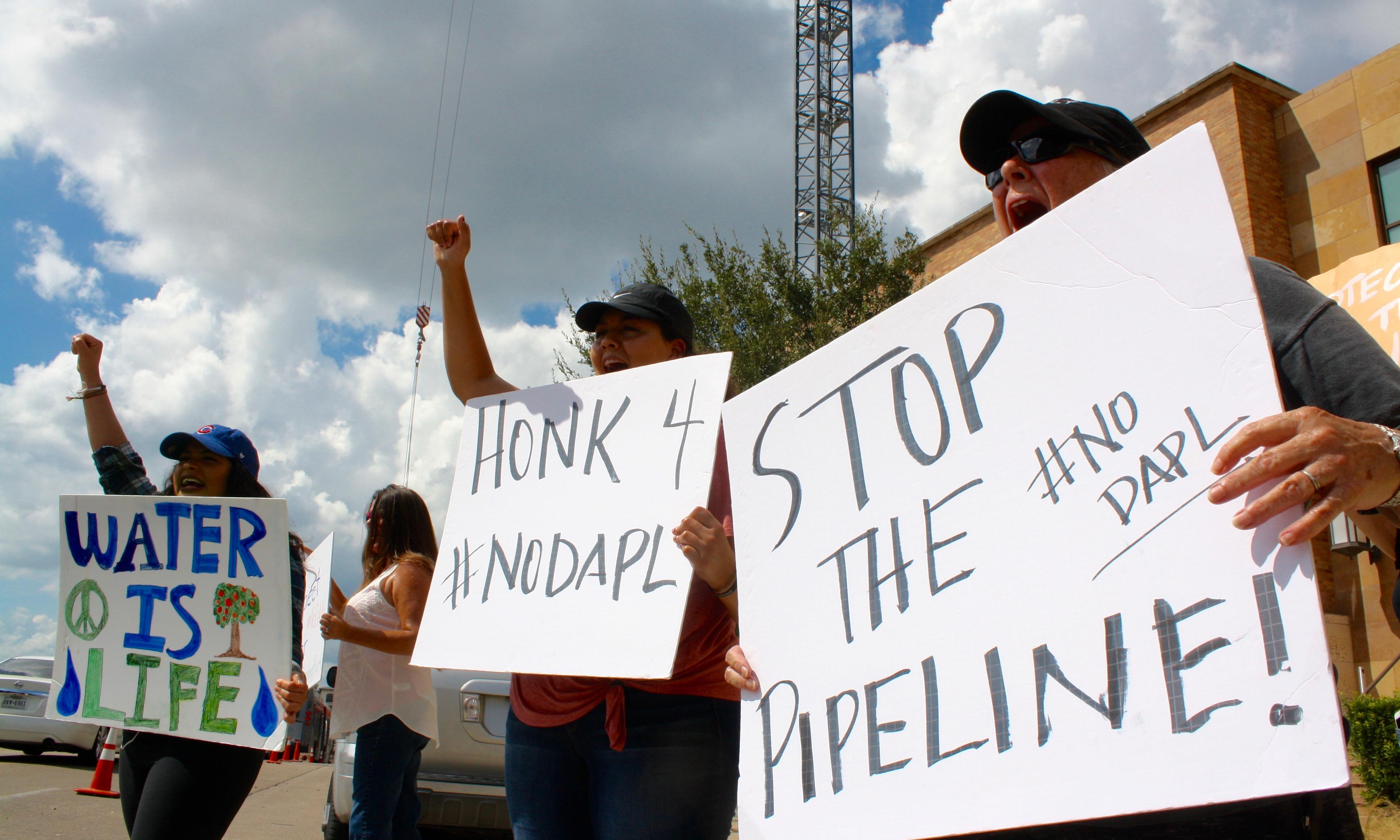
Support for the water protectors at Standing Rock fighting construction of Energy Transfer’s Dakota Access Pipeline Project has begun to overflow to home-state struggles like the year-long contest between Big Benders and a planned 148-mile pipe intended to move West Texas gas into northern Mexico.
This week, members of the American Indian Movement, Central Texas chapter, join a broad local coalition for a march in Alpine, Texas. More than a few convoys of the pipeline-resistant will be headed to the Big Bend this Friday for a solidarity march on Energy Transfer’s Trans-Pecos.
Same company, different channel.
You can find details about the Trans-Pecos Pipeline which has been cutting a channel through the high desert region (and at least one documented prehistoric campsite) at Defend Big Bend, Big Bend Conservation Alliance, Truthout, and (of course) Energy Transfer’s website.
[Also, watch the Austin Chronicle site this week for a feature story on Standing Rock, indigenous resistance, and resulting organizing shifts in the fight against extractive exercises like the Trans-Pecos line.]
See the official press release below for march details:
American Indian Movement of Central Texas Stands With Big Bend and Standing Rock Sioux
Groups partner to oppose controversial oil and gas pipelines
Alpine, TX – The American Indian Movement of Central Texas (AIMCTX) will gather in downtown Alpine, TX, with allies to march to an Energy Transfer Partners’ (ETP) Trans-Pecos Pipeline (TPPL) construction site in a show of solidarity with the Standing Rock Sioux, who are protesting the Dakota Access Pipeline (DAPL). The peaceful, nonviolent, nonpartisan gathering will take place Friday, September 30, from 10:00 am to 1:00 pm.
The Big Bend Stands With Standing Rock: Water is Life Solidarity March is a collaboration of AIMCTX, Defend Big Bend, Big Bend Conservation Alliance, and the Big Bend Sierra Club.
The Federal Energy Regulatory Commission’s (FERC) decision to grant permits for the TPPL pipeline, designed to export methane gas while packaged as a public-good utility, remains in appeal at the federal court level. The pipeline will cut a 143 mile-swath through one of the last areas of wilderness in Texas, and could desecrate as many as one ancient Native American site per square mile of its path. The Trap Springs archeological site, a very recent and significant find, is in imminent danger of being bulldozed despite evidence of at least 5,000 years of occupation and a pending nomination as a State Archeological Landmark.
In addition, the export pipeline will connect with Mexico’s burgeoning pipeline network, augmenting Mexico’s reserves of 545 trillion cubic feet of methane gas (U.S. Dept of Energy) that could be extracted via fracking. The intense exploration and production projected in Mexico’s vast fields will spawn a climate change multiplier of significant proportions.
The recent ten-billion-barrel discovery of hydro-carbons (said to be the largest in ten years worldwide) at the nearby Alpine High field in Far West Texas by Apache Corporation already has their CEO John Christmann excited for sales to Mexico to tie-back into Waha (start of the proposed TPPL) and expects to be exporting by the second half of 2017, according to his recent comments in a Barclay Bank seminar. Many Big Bend communities feel the Trans Pecos Pipeline and the new oil and gas infrastructure of Balmorhea and the Alpine High Field will threaten their limited water resources.
Chief William Hoff of the Tsalagiyi Nvdagi Cherokee tribe said the Bird’s Fort Treaty of 1843 signed with the Republic of Texas guaranteed hunting and subsistence rights of the native peoples of Texas but was not honored when the Republic became a state. “Big oil and gas and nuclear will destroy our plants, animals, water, and air. So, to me that is a violation of that treaty!” said Hoff.
###
Featured image of Big Bend National Park courtesy of Adbar and Wikimedia Commons.








